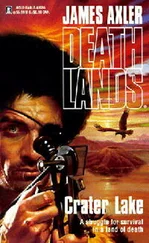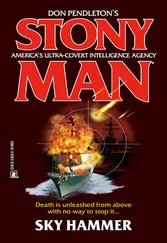Another of the men spoke then, addressing his question to Rock Streaming. Like Good Father, this man was older than the other three, with a clumpy beard and flecks of gray appearing in his tangled hair. He wore a waistcoat over his chest and rounded belly, with grubby shorts, and had also left his feet bare. His gray eyes held a quality of tremendous age that seemed somehow out of place in a human being. “And you are sure that they have no inkling that you are monitoring them?” he asked, his voice the low rumble of a distant storm. “You are sure? ” he emphasized.
Rock Streaming nodded, looking up from his crouching position before the glowing laptop screen. “These Americans have no idea that I’m watching them, Bad Father,” he said with certainty.
One of the tattooed young men spoke up, his tone respectful to the older tribesmen but still proud of his contemporary. “They say that to be hacked by Rock Streaming is to be caressed by a secret lover, Bad Father,” he assured the old man in the vest. “The system cries out for more but refuses to speak of the tryst to its operators.”
Bad Father nodded, his lips pressed together in a thin line. “Let me know of any developments,” he instructed Rock Streaming. Then he turned away in unison with Good Father, and the pair headed toward the tunnel that led out of the cave.
Still crouching at the glowing laptop monitor, Rock Streaming turned to his two remaining colleagues and nodded once in silent acknowledgment. In the linear, subjective world, the time was coming.
The breakthrough finally came two days later, when geologist Mariah Falk recognized a sequence of digits tucked away in the streams of coded information as an old-fashioned grid reference. As soon as she pointed it out, Lakesh slapped his forehead for being so stupid as to not notice it before.
“But where is this coordinate referencing?” he asked her as they sat together in the cafeteria that sometimes doubled as a meeting hall for the Cerberus personnel.
Brigid sat with them, prodding a fork through a yellow swirl of scrambled eggs on her plate. “Let me see,” she suggested, looking at the deciphered location code on Lakesh’s printout.
Mariah, a large woman who, while not especially attractive, had an ingratiating smile and an amazingly resilient personality, closed her eyes tightly as she tried to work out the reference numbers. Her arms moved before her, gesturing up and to her right for a few moments before she opened her eyes and spoke. “Northwest Russia somewhere, I think. I’d need to see a map to get you any closer than that, though,” she admitted.
“Great,” Brigid muttered disconsolately, “more snow.”
Lakesh was already standing, and he took in a hearty breath as he looked at his companions. “If Mariah is right, we can use this system to decrypt the contents of the computer and find out what it is we’ve been looking at for the past five days.”
It took another half day to write the decryption software and run the program through the files they had found, and even then parts of it appeared to be horribly vague or incomplete. But it turned out that Mariah’s observation was a Rosetta stone, giving them the key. After a few tweaks, a refined version of the decryption was applied and a wealth of military reports opened up to Lakesh and his team.
A lot of the files were nothing more than personnel records and requisition forms, but several items held interest. Brigid took it upon herself to investigate one sequence further, putting in long hours to piece together all of its scattered parts.
Lakesh called Kane, Grant and Brigid together for an informal meeting in the empty cafeteria the next evening, and he sat beside Brigid, facing the two ex-Mags. Brigid had worked throughout the past thirty hours, transcribing important details from the files and piecing the information together with her own formidable knowledge. What she had come up with had been quite astonishing, Lakesh agreed, assuming that it was accurate.
“The main files on the recovered computer dealt with information from one of the U.S. spy networks,” Lakesh explained as Grant poured everyone water from a large jug in the center of the table. “From what we can divine, this network was a crucial player in the days leading up to the Cold War, when the U.S. was focused on the growing threat of Russian military might. They kept files on a variety of military projects that were being researched behind the iron curtain, some of more questionable value than others.”
“Watching folks through gaps in the drapes.” Kane smiled. “Nice work if you can get it.”
“Now, the vast majority of this information is bitty and of very limited use over two hundred years after it was amassed,” Lakesh continued, “but we’ve found one item of exceptional interest. Brigid has been concentrating on going through and deciphering all of its related notes.”
Lakesh turned to Brigid and she picked up the explanation after stifling a tired yawn. “According to the U.S. report, it seems that the Russians had developed a project dubbed Chernobog. Chernobog is the name of a Slavic god known as ‘the bringer of calamities.’”
“Sounds like a honey,” Grant chirped.
“Now, the mythology behind the name isn’t important,” Brigid continued, “but the threat that it implies may very well be. From what the intelligence network could piece together, Project Chernobog was set up as a subsection of the Cheka Agency. The Cheka was the government division that ultimately became the KGB, a lethal secret police force at the beck and call of, at the point of its inception, Lenin. In 1920, with the First World War just behind them and growing alarm at the potentially disruptive influence of outside forces on their then nascent communism, the Russian Communist Party set things in motion to create a weapon so powerful that it could eradicate all forms of life from a specified area.” She drew a long breath before continuing. “Furthermore, this weapon was apparently proposed as a fail-safe not for the ‘evil’ outside forces of America and Western Europe, but for something conceived as a far more insidious and dangerous threat—the Archons.” She stopped, her emerald eyes skewering each of the three people sitting at the table. “Aliens,” she said finally.
“Kind of stands to reason,” Kane admitted after a moment’s thought. “Our boys are spying on them and they’re spying on us. They see the U.S. government getting pally with the Roswell day-trippers and they start to think, ‘Hey, maybe we need one of those ultimate-weapon-type things just in case.’”
“The Roswell visitation was in 1947,” Brigid told Kane, “over twenty years after Project Chernobog was initiated.”
“Well,” Kane responded, “the point is there has been a lot of alien activity over the years, and we’ve seen more than our share of evidence the visitors had their fingers in the U.S. government pie for a long time. If I was building up a society that stood opposed to that government, I’d make damn sure I could take out their benevolent, technologically advanced friends.”
Brigid nodded, conceding his point. “Now, and I must emphasize this, what we’re looking at here are spy reports. Which is to say, the veracity of this information is suspect, and it is almost certain that all of the facts are not present. Furthermore, given the general climate of the espionage divisions on both sides, it’s a given that any report will put the worst possible spin on a situation concerning the enemy.”
Grant poured himself another glass of water and gestured the jug around to see if anyone else wanted more. “So lay it on the line for us, Brigid,” he said. “What are we actually looking at?”
Читать дальше












